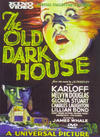FILM NOTES
FILM NOTES INDEX
NYS WRITERS INSTITUTE
HOME PAGE

 The Old Dark House
The Old Dark House
(United States, 1932, 70 minutes, b&w, 16mm)
Directed by James Whale
Cast:
Boris Karloff . . . . . . . . . . Morgan
Melvin Douglas . . . . . . . . . . Roger Penderel
Charles Laughton . . . . . . . . . . Sir William Porterhouse
Lilian Bond . . . . . . . . . . Glayds DuCane
The
following film notes were prepared for the New York State Writers
Institute by Kevin Jack Hagopian, Senior Lecturer in Media Studies
at Pennsylvania State University:
Director James Whale's horror masterpiece, Frankenstein, was in its triumphant first release when The Old Dark House went into production. Frankenstein was making torrents of money for lowly Universal studios, and bringing the studio something else it rarely tasted: prestige. When the film had premiered, Whale's unique directorial touch -- simultaneously macabre and urbane, horrific and sly -- had baffled Universal executives. They wondered how audiences and critics would take this entirely new and frightening style of horror filmmaking. In fact, everyone found something compelling in the film. For audiences, it was the sheer kinetic joy of fright. The film induced everything from palpitations to sleeplessness in viewers, and startled critics with its systematic visual and narrative excessiveness, its perverse elegance. James Whale, born of modest circumstances in England in 1889, a prisoner of war in World War I, a talented painter, an actor, and a rising theatrical director, he had come to the US as the director of the highly successful war play Journey's End. A slim, handsome dandy, Whale affected the manners of the English gentleman he wished he had been born as, and Hollywood was instantly taken with him. He was engaged to direct the sound sequences of Howard Hughes' World War I aviation epic, Hell's Angels, originally shot silent, but revised for the new medium of the sound film. Highly successful films followed for Whale, including the film version of Journey's End and Waterloo Bridge. In the wake of Frankenstein, Whale had the run of the studio.
He chose his next project from a (to Hollywood) obscure novel by English author J.B. Priestley called The Benighted. An allegory in social criticism, Priestley's book concerned a group of travelers who must unwillingly spend a night together in a strange Welsh home. There, in too-close quarters, the classes collide, and the self-confidence of wealth and station wear thin. It was a notably English story, and for Whale, who kept his lower-class origins a deep secret, the confrontation between rich, poor, and in-between was one which, for him, was the essential truth of English society.
And yet, Whale seemed not to be able to take himself as seriously as that. His sense of humor was sarcastic, literary, and eccentric; it had been the means by which he had coped with and then escaped his childhood poverty. He saw to it that the story was adapted as The Old Dark House, and presented with characteristically Whalesian combination of wacky humor and Gothic creepiness. The hook of Priestley's story is still there: a group of disparate souls are marooned on a soggy English night in a weird old house. And while class is still a factor in their grating relationships, the sheer oddness with which Whale views the proceedings makes it hard to see The Old Dark House as an essay in class analysis. The cast assembled on this rainy night is sumptuous. The house is owned by cadaverous Ernest Thesiger as Horace Femm, and Eva Moore as his deaf wife, the religious zealot Eva Femm. A youthful Melvyn Douglas plays Roger Penderel, a part in Priestley's original which called for cynical, war-induced trauma, but which Douglas shades into comedy with his customary world-weariness. Raymond Massey and the radiant Gloria Stuart as the quarreling Philip and Margaret Waverton, and Brember Wells as Saul, the mad bomber. Whale tops it off with his old friend Charles Laughton as Sir William Porterhouse, a crass, new money Yorkshire millionaire.
And there is Boris Karloff, skulking about the corridors as Morgan, the fearsome mute butler. In person, Karloff was the warmest of men, a crusader for the rights of actors (he helped found the Screen Actors Guild), and an easy touch for anyone down on their luck. The Old Dark House is like that, too: a house of horrors on the outside, but a collection of inviting eccentricities on the inside. The Old Dark House is as screwy as horror can get and still chill your blood to ice water with its ghoulish faces in the mirror, candlelit hallways, and raging storms just outside the windows. Art director Charles D. Hall purposely built the house set for the film as collection of improbable floorplans and irreconcilable angles, a maze masquerading as a mansion. Alternately sensual and repugnant in its commentary on the sleeping arrangements implied by the crowded circumstances of the house (the film was made in the brief period between the coming of sound and the puritanical reaction of the Production Code, in 1934), The Old Dark House is, if anything, more fascinated with sexuality than with class. Whale was gay, and the rain-beaten house and its sullen prisoners are, for him, a Grand Hotel of the repressive habits of conventional heterosexuality. Indeed, the film's only truly tender moment is a beautifully staged and utterly unexpected homoerotic one.
Shrill, sly, and terrifying, The Old Dark House would coin a new horror subgenre, just as Frankenstein had; this time, the species would bear the name of Whale's remarkable film. Ever since, in films like The Haunting and Rosemary's Baby, we have been cheerfully going into The Old Dark House first let to us by James Whale.
— Kevin Hagopian, Penn State University
For additional information, contact the Writers Institute at 518-442-5620 or online at https://www.albany.edu/writers-inst.